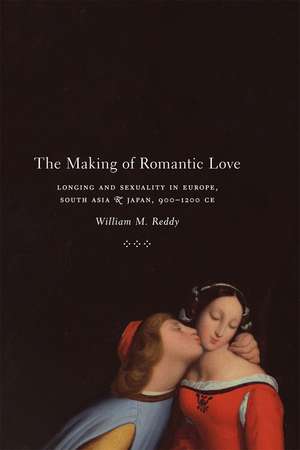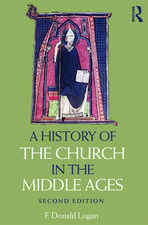The Making of Romantic Love: Longing and Sexuality in Europe, South Asia, and Japan, 900-1200 CE: Chicago Studies in Practices of Meaning
Autor William M. Reddyen Limba Engleză Paperback – 30 aug 2012
In the twelfth century, the Catholic Church attempted a thoroughgoing reform of marriage and sexual behavior aimed at eradicating sexual desire from Christian lives. Seeking a refuge from the very serious condemnations of the Church and relying on a courtly culture that was already preoccupied with honor and secrecy, European poets, romance writers, and lovers devised a vision of love as something quite different from desire. Romantic love was thus born as a movement of covert resistance.
In The Making of Romantic Love: Longing and Sexuality in Europe, South Asia, and Japan, William M. Reddy illuminates the birth of a cultural movement that managed to regulate selfish desire and render it innocent—or innocent enough. Reddy strikes out from this historical moment on an international exploration of love, contrasting the medieval development of romantic love in Europe with contemporaneous eastern traditions in Bengal and Orissa, and in Heian Japan from 900-1200 CE, where one finds no trace of an opposition between love and desire. In this comparative framework, Reddy tells an appealing tale about the rise and fall of various practices of longing, underscoring the uniqueness of the European concept of sexual desire.
Din seria Chicago Studies in Practices of Meaning
-
 Preț: 231.82 lei
Preț: 231.82 lei -
 Preț: 282.53 lei
Preț: 282.53 lei -
 Preț: 200.26 lei
Preț: 200.26 lei -
 Preț: 183.60 lei
Preț: 183.60 lei -
 Preț: 236.64 lei
Preț: 236.64 lei -
 Preț: 186.85 lei
Preț: 186.85 lei -
 Preț: 237.74 lei
Preț: 237.74 lei -
 Preț: 229.35 lei
Preț: 229.35 lei -
 Preț: 217.71 lei
Preț: 217.71 lei -
 Preț: 260.44 lei
Preț: 260.44 lei -
 Preț: 268.20 lei
Preț: 268.20 lei -
 Preț: 246.07 lei
Preț: 246.07 lei -
 Preț: 284.66 lei
Preț: 284.66 lei -
 Preț: 228.38 lei
Preț: 228.38 lei -
 Preț: 292.28 lei
Preț: 292.28 lei -
 Preț: 403.00 lei
Preț: 403.00 lei - 23%
 Preț: 669.93 lei
Preț: 669.93 lei -
 Preț: 242.40 lei
Preț: 242.40 lei - 15%
 Preț: 195.04 lei
Preț: 195.04 lei - 9%
 Preț: 287.12 lei
Preț: 287.12 lei - 17%
 Preț: 166.70 lei
Preț: 166.70 lei - 14%
 Preț: 199.02 lei
Preț: 199.02 lei - 18%
 Preț: 178.07 lei
Preț: 178.07 lei - 19%
 Preț: 148.73 lei
Preț: 148.73 lei - 22%
 Preț: 433.25 lei
Preț: 433.25 lei - 18%
 Preț: 152.10 lei
Preț: 152.10 lei
Preț: 392.77 lei
Nou
Puncte Express: 589
Preț estimativ în valută:
75.16€ • 78.67$ • 62.55£
75.16€ • 78.67$ • 62.55£
Carte tipărită la comandă
Livrare economică 01-15 aprilie
Preluare comenzi: 021 569.72.76
Specificații
ISBN-13: 9780226706276
ISBN-10: 0226706273
Pagini: 456
Dimensiuni: 152 x 229 x 30 mm
Greutate: 0.61 kg
Editura: University of Chicago Press
Colecția University of Chicago Press
Seria Chicago Studies in Practices of Meaning
ISBN-10: 0226706273
Pagini: 456
Dimensiuni: 152 x 229 x 30 mm
Greutate: 0.61 kg
Editura: University of Chicago Press
Colecția University of Chicago Press
Seria Chicago Studies in Practices of Meaning
Notă biografică
William M. Reddy is the William T. Laprade Professor of History and professor of cultural anthropology at Duke University. He is the author of a number of historical works, including The Navigation of Feeling: A Framework for the History of Emotions.
Cuprins
Acknowledgments
Introduction
PART ONE The Emergence of Courtly Love in Europe
1 Aristocratic Speech, the Gregorian Reform, and the First Troubadour
2 Trobairitz and Troubadours and the Shadow Religion
3 Narratives of True Love and Twelfth-Century Common Sense
PART TWO Points of Comparison
4 The Bhakti Troubadour: Vaishnavism in Twelfth-Century Bengal and Orissa
5 Elegance and Compassion in Heian Japan
Conclusion
PART ONE The Emergence of Courtly Love in Europe
1 Aristocratic Speech, the Gregorian Reform, and the First Troubadour
2 Trobairitz and Troubadours and the Shadow Religion
3 Narratives of True Love and Twelfth-Century Common Sense
PART TWO Points of Comparison
4 The Bhakti Troubadour: Vaishnavism in Twelfth-Century Bengal and Orissa
5 Elegance and Compassion in Heian Japan
Conclusion
Appendix: Transliterated South Asian Words
Bibliography
Index
Recenzii
“Let the debates begin! Drawing on an astonishing panoply of sources, from European courtly and troubadour literature to Heian Japanese poetry, from canon law to Puri temple dancing, William M. Reddy’s important new book, The Making of Romantic Love, challenges our basic assumptions about eroticism, heroism, the nature of marriages, and the legacy of the Middle Ages in modern culture. Is there a ‘sex drive’? Or is this, too, a western construct? Like one of Reddy’s ‘emotives,’ reading this impressive study will leave you a different person."
"This is a magnificent book and a powerful theoretical challenge. Historians of any kind will ignore it at their peril."
“Reddy’s theoretical and methodological work here is both meticulous and sophisticated (he, after all, has played no small role in articulating and honing the theoretical foundation of the historical study of emotions), and his case studies are recondite enough that only the true subspecialist might possibly identify any misstep or oversight. Reddy is, in any case, a compelling storyteller, and while scholars of emotions (and graduate students) will benefit greatly from reading just the introduction (which is packed with the latest emotions research and theory--including recent work in neuroscience), those who journey with Reddy into the emotive heart of the medieval world will not regret it.”
“A work of breathtaking ambition. . .The intellectual payoff for the author’s prodigious intellectual labor is that he can convincingly challenge contemporary (and seemingly scientifically validated) wisdom about sexuality in the West.”
















